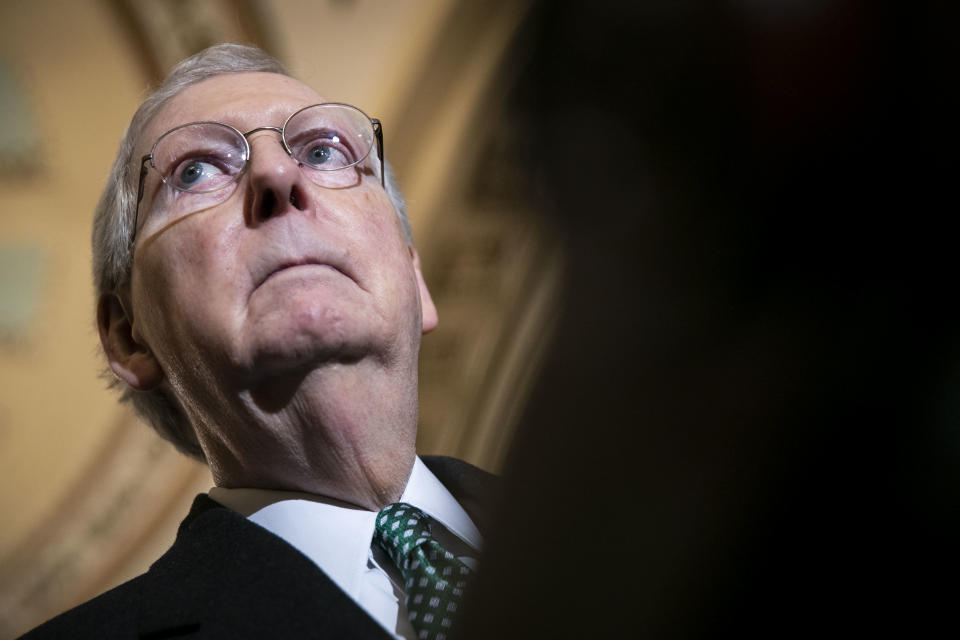Republicans Want To Change The Rules To Confirm Trump's Nominees Even Faster
WASHINGTON ― Republicans want to change Senate rules to confirm President Donald Trump’s nominees even more quickly, and they’re threatening to do so unilaterally if Democrats don’t join them in supporting the move.
The Senate Rules & Administration Committee approved a proposal on Wednesday that would drastically shorten the amount of time lower judicial and executive nominees could be debated on the Senate floor. The 10-9 vote was along party lines, with every Democrat on the committee opposed.
Under current rules, senators have up to 30 hours to debate a nominee after they have voted to advance the nomination to a final vote ― otherwise known as post-cloture time. Republicans say Democrats are wildly abusing this process to slow the confirmation of many noncontroversial lower court and administrative nominees. They point out that some government agencies are having to run with a bare-bones staff because many of their lower-ranking administrative nominees are still awaiting a confirmation vote.
The GOP proposal, which was introduced by committee Chairman Roy Blunt (R-Mo.) and by James Lankford (R-Okla.), would limit that post-cloture debate time to two hours per nominee ― significantly speeding up the process. It’s similar to a temporary deal on nominations that then-Senate Majority Leader Harry Reid (D-Nev.) negotiated with Republicans in 2013 ― except the Blunt proposal would change the rules permanently.
“You can’t continue to abuse the system like Democrats have been and not expect for people to try to end that abuse,” Blunt told HuffPost last week.
Trump’s nominees for lower-level government posts have had an unusually high number of calls for Senate cloture votes to cut off debate and move to the final vote, according to the Pew Research Center. However, Republicans employed the tactic of drawing out debate with equal zeal to slow the confirmation of President Barack Obama’s nominees after his re-election in 2012, a pattern that led to Reid’s rules change in 2013.
Sen. Amy Klobuchar (Minn.), the top Democrat on the rules committee, said during the markup hearing that Republicans are pursuing the change “only because they want to ram more nominees through.” She noted that part of the reason some government agencies aren’t running at full capacity is that the White House simply hasn’t nominated anyone to the posts.
“This is a big deal; this is not just a minor proposal to come our way,” Klobuchar said on Wednesday.
While the proposal was reported favorably out of committee on Wednesday, it will likely fall short of the 60-vote threshold necessary for final passage due to Democratic opposition. Senate Minority Leader Chuck Schumer (D-N.Y.) told reporters earlier this week that he would oppose it unless Republicans agree to move the threshold on Supreme Court nominations back up to 60 votes or restore the use of “blue slips” over judicial nominees. Republicans abandoned the long-standing tradition after Trump’s election, a practice that has been followed by both parties for decades and allows senators from a nominee’s state to express their opinion on the individual.
Republicans suggested on Wednesday that they intend to move forward and pass the new rules proposal unilaterally by going “nuclear” on the Senate floor ― a move that would require only 51 votes for approval.
“Make no mistake that Republicans can change this and will,” Sen. Lamar Alexander (R-Tenn.), a top ally of Senate Majority Leader Mitch McConnell (R-Ky.), said during the hearing.
Few things generate acrimony in the Senate like rules changes ― especially from those who are in the minority. Democrats complained about GOP obstruction on nominations under Obama and eliminated the 60-vote threshold on the president’s picks to appeals courts as a result. When Republicans took power, McConnell subsequently changed the rules on Supreme Court nominations in order to confirm Neil Gorsuch.

In the first two years of Trump’s presidency, Republicans have confirmed judicial nominees at a historic pace with scores of conservative new appeals, circuit and district court judges in the federal judiciary. They’ve also succeeded in confirming two of Trump’s picks to the Supreme Court: Gorsuch and Brett Kavanaugh.
McConnell’s refusal in 2016 to consider Merrick Garland, Obama’s nominee to the Supreme Court, remains a raw issue among many Democrats in the Senate. The blockade of Garland came up, again and again, at the hearing on Wednesday after Republicans complained about “record” Democratic obstruction in the Senate.
“It was a conscious decision made by the majority leader to deny us the ordinary tradition of filling this vacancy,” Sen. Dick Durbin (Ill.), the No. 2 Senate Democrat, told McConnell at one point.
“The level of comity here is out of whack,” McConnell, who also sits on the committee, responded after noting previous Democratic-led rules changes. He added that the Blunt proposal, which Republicans could use immediately to confirm more of Trump’s nominees, does not “in any way seriously disadvantage the minority.”
Related Coverage
Senate Republicans Eye Change To Filibuster Rules
Mitch McConnell, A Modern-Day Machiavelli
Love HuffPost? Become a founding member of HuffPost Plus today.
This article originally appeared on HuffPost.

